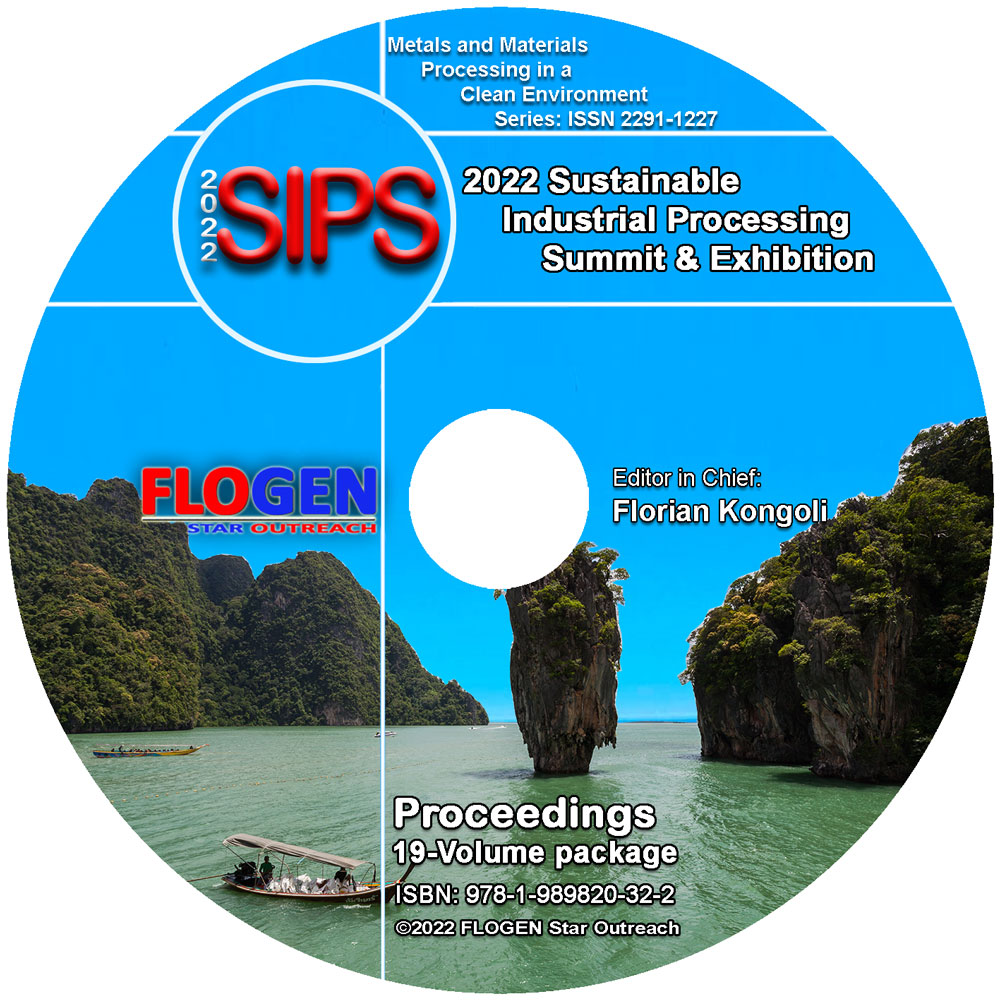2022-Sustainable Industrial Processing Summit
SIPS2022 Volume 18 Intl. Symp on Advanced Materials, Polymers, Composite, Nanomaterials, Nanotechnologies and Manufacturing
| Editors: | F. Kongoli, F. Marquis, N. Chikhradze, T. Prikhna, M. De Campos, S. Lewis, S. Miller, S. Thomas. |
| Publisher: | Flogen Star OUTREACH |
| Publication date: | 22 December 2022 |
| Pages: | 290 pages |
| ISBN: | 978-1-989820-68-1(CD) |
| ISSN: | 2291-1227 (Metals and Materials Processing in a Clean Environment Series) |

CD shopping page
Physical properties of vegetable bars produced on the basis of frozen vegetables and apple pomace in the aspect of their functional properties
Monika Janowicz1; Agnieszka Ciurzyńska2; Andrzej Lenart2; Magdalena Karwacka3;1WARSAW UNIVERSITY OF LIFE SCIENCES, Warsaw, Poland; 2WARSAW UNIVERSITY OF LIFE SCIENCES - SGGW, Warsaw, Poland; 3DEPARTMENT OF FOOD ENGINEERING AND PROCESS MANAGEMENT, WARSAW UNIVERSITY OF LIFE SCIENCES, SGGW, Warsaw, Poland;
Type of Paper: Regular
Id Paper: 115
Topic: 43
Abstract:
Trends that characterize the food industry today include food waste and overproduction in rich countries, as well as malnutrition and hunger among the population of underdeveloped regions. The largest part of food waste is fresh products, including fruit and vegetables, which are prone to spoilage, which makes them short-lived. At the same time, many sectors of the food industry do not manage full-value waste, whose processing potential is possible to use in terms of structure-building, nutritional and nutritional aspects in newly created, innovative products that fit into the strategy of sustainable development by utilizing raw materials, which are unfortunately wasted [1]. The activities undertaken by scientists in the fight against the problem are aimed at seeking the possibility of using available raw materials to produce easy-to-distribute food with an extended shelf life and developing innovative production techniques whose introduction will result in an improvement in the economic situation in the face of the described trends [2,3].
The purpose of the work was to develop a recipe composition and technology for the production of freeze-dried vegetable products formed in the form of bars. The research used full-fledged industrial output from the production of frozen vegetables, i.e. green and yellow-green string beans, carrots and potatoes, and dried apple pomace. As part of the work, selected properties of raw materials and obtained products were also examined. Presented research are the stage of the project BIOSTRATEG 3/343817/17/NCBR/2018 “Development of healthy food production technologies taking into consideration nutritious food waste management and carbon footprint calculation methodologyâ€.
Tests of the properties of finished products have shown that they are characterized by very low water activity, in the range of 0.01 - 0.02 and humidity not exceeding 2%. The obtained freeze-dried vegetable bars were characterized by high porosity at the level of 86.8-89.5% depending on the composition of the vegetable input. The high porosity and low content and activity of the finished products obtained determine their hygroscopicity, which has a significant impact on the need to select optimal storage conditions in terms of the type of packaging due to its barrier, temperature and humidity of the surrounding environment.
It was shown that the shrinkage of freeze-dried vegetable products formed in the form of bars resulting from the freeze-drying process was at the level of several percentage points, and its size was dependent on the composition of the processed vegetable feed, in accordance with the developed innovative technology. It was observed that the more the material volume decreased, the higher the density and lower porosity of the finished products.
Keywords:
New and advanced materials; New and advanced technology; Sustainable development; storage and use;References:
1. Miranda J., Ponce P., Molina A., Wright P. 2019: Sensing, smart and sustainable technologies for Agri-Food 4.0. Computers in Industry, 108, 21-36.2. Coteur I., Marchand F., Debruyne L., Lauwers L. 2019: Understanding the myriad of sustainable development processes in agri-food systems: a case in Flanders. Journal of Cleaner Production, 209, 472-480.
3. Negra C., Remans R., Attwood S., Jones S., Werneck F., Smith A. 2020: Sustainable agri-food investments require multi-sector co-development of decision tools. Ecological Indicators, 110, 105851.